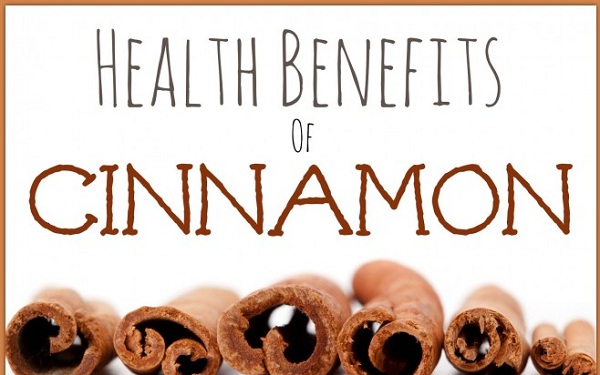Cinnamon, the name for several species of trees and the commercial spice products that some of them produce, is a spice obtained from the inner bark of several tree species from the genus Cinnamomum. Cinnamon is used mainly as an aromatic condiment and flavouring additive in a wide variety of cuisines, sweet and savoury dishes, breakfast cereals, snack foods, bagels, teas, hot chocolate and traditional foods.
The aroma and flavour of cinnamon derive from its essential oil and principal component, cinnamaldehyde, as well as numerous other constituents including eugenol. However, this aromatic spice is also known for its medicinal properties for thousands of years.
One tablespoon of grounded cinnamon contains 1.4 grams of fibers and enough amount of calcium. It also contains vitamin A, vitamin B, and vitamin K, and some antioxidants.

Cinnamon has been shown to reduce fasting blood glucose levels in individuals with type 2 diabetes and regular consumption of cinnamon can lower total cholesterol, LDL cholesterol and triglyceride levels.
Cinnamon has been used traditionally to aid digestion and relieve gastrointestinal discomfort.
Cinnamon may help improve insulin sensitivity and reduce insulin resistance in individuals with polycystic ovary syndrome (PCOS).
Some health benefits of cinnamon supported by scientific research includes:

Acts as anti-bacterial, anti-viral and anti-fungal: Cinnamaldehyde, the main active component of cinnamon, may help fight various kinds of infection. Cinnamaldehyde is an essential oil present in the bark displays anti-bacterial, anti-viral, and anti-fungal properties. It inhibits certain bacteria like salmonella and also controls respiratory infections caused by fungi. It is also a natural coagulant that can prevent bleeding.
Full of antioxidants: Antioxidants can reduce oxidative stress that has been proven to damage cells and contribute to nearly every chronic disease such as type 2 diabetes and cinnamon is rich in antioxidants such as choline, beta carotene and alpha-carotene. Cinnamon also acts as a natural food preservative.
Reduce inflammation: Cinnamon fights against the infection and repairs damaged tissue. Cinnamaldehyde present in it helps to reduce the swelling and prevent blood platelets from clumping together. It is useful in acute as well as chronic pain conditions such as arthritis. Cinnamon also enhances blood circulation and pushes circulation to the joints where blood circulation is disturbed.
Manage type 2 diabetes: Insulin is an important hormone to control your blood sugar levels and to regulate your metabolism. Daily consumption of cinnamon improves insulin sensitivity and helps to regulate blood sugar levels. It slows down the breakdown of carbohydrates in the digestive tract, which results in a reduced amount of glucose entry in circulation.
Drinking cinnamon tea after dinner might help to reduce your blood sugar levels at night, leading to better metabolic health, avoiding the occurrence of metabolic diseases, and even supporting weight loss. The active compounds in cinnamon help regulate blood sugar by improving insulin sensitivity.
Cinnamon contains a compound called cinnamate that may decrease enzyme activity that makes cholesterol, thus reducing the number of fatty acids in the blood. It helps to reduce bad cholesterol in your body that reduces the risk of heart disease.
Reduce blood pressure: Some evidence suggests that the consumption of cinnamon is associated with a short-term reduction in blood pressure. It also helps to reduce the cholesterol levels that help to reduce the risk of heart problems.
Cancer protection: Cinnamon has anti-cancerous properties. It inhibits the growth of cancer cells and prevents the formation of blood vessels in tumors. Daily consumption of cinnamon provides a protective action against cancer, particularly colon cancer.
Skin care: Cinnamon is best for skin health. It helps to reduce the acne-forming bacteria, and keeps skin shiny and smooth. As skin ages, skin loses its elasticity due to the reduction of collagen and elastin that makes your skin dull. Many lotions may provide this protein to regain the natural elasticity, but the cinnamon extract is best.
Reduce symptoms of Alzheimer’s and Parkinson’s disease: Cinnamon is a neuro-protective that helps neurons and improves motor function. Compounds found in cinnamon inhibit the growth of a protein named tau in the brain, it is one of the trademarks of Alzheimer’s disease.
You can eat cinnamon sticks. But they’re more commonly used as ways to add flavor to drinks or dishes.
READ ALSO: Cross River govt recounts EndSars loss, warns against nationwide protest







